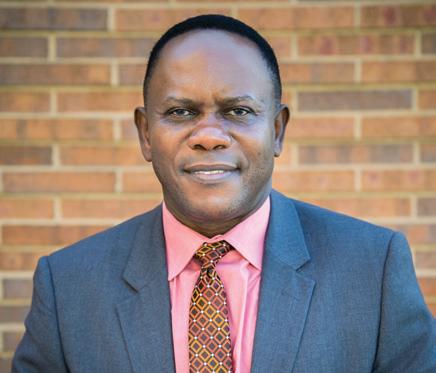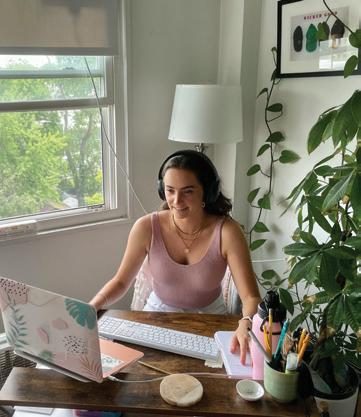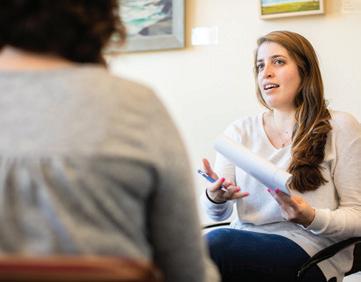







As the nation’s first institution of higher learning to offer training for clinical social workers, the Simmons School of Social Work (SSW) provides a rigorous clinical social work education.
We make sure that you have direct and frequent access to faculty who know your name and understand your goals. Small class sizes, case-based discussions, experiential learning, and seminars contribute to the personal and very practical learning experience.
Our traditional campus-based MSW program is offered at an ideal location in the Fenway, right next to the Longwood Medical Area. Our online MSW program allows students the flexibility to access our programs from wherever they live. More information about our online programs can be found at online.simmons.edu
A Simmons education prepares you for leadership in your career, a commitment to social justice principles, and engagement in meaningful work.
Simmons SSW is highly regarded for its hands-on fieldwork approach, which allows students to experience in-depth training in social service settings. We also offer a supportive and distinctly collaborative academic community rarely found at larger universities.
Bottom line? We want you to succeed.
• Highly specialized in clinical social work education
• Outstanding and diverse faculty who are active practitioners, scholars, and researchers
• The only school in Massachusetts using Social Work Simulation Education, a cutting-edge clinical social work training tool
• More clinical practice opportunities with interdisciplinary team from other health professions
• Small class size with 18 to 22 students
• 24 hours per week of field internships during two years— more field hours than any other school in Boston
• Evidence-based approaches to clinical challenges
• Full-time and extended-study options
• Specialized course of study with certificate options
• A Simmons social work community committed to social justice
• Small, accessible campus in the heart of Boston and the Longwood Medical Area

We offer two-, three-, or four-year programs to qualified applicants with a bachelor’s degree in any field. Our progressive, hands-on curriculum combines education and practice with social justice values and a strong emphasis on field education. The Master of Social Work program includes two one-year, 24-hour-per-week field placements from September to May.
The program is a total of 65 credits.
Our Accelerated 16-Month MSW program allows students to complete their MSW degree in four consecutive semesters over 16 months. The plan of study starts in January with students taking courses in the spring, summer, fall, and following spring semesters. Students are in field placements each semester. The accelerated MSW is the only on-campus program of its kind in New England. The 16-month MSW program enrolls a small number of students each year. This program has the same coursework, requirements, and field placements as the two-year full-time and three-year extended programs, but students earn their degree one semester sooner.
Due to the accelerated course schedule, previous strong undergraduate academic performance is required, and substantial prior work and/or volunteer experience in social work/human services is strongly recommended.
The program is a total of 65 credits.
This program is offered to qualified applicants with a bachelor’s degree in social work (BSW) who have graduated within the last five years from a program accredited by the Council on Social Work Education (CSWE). This program can be completed in 9 months or in 24 months. It includes one, 24-hour-per-week field placement from September to May and eight advanced-level courses. Students also engage in a weekly field education seminar during the two semesters that they are completing their field placements. The program is a total of 34 credits.
This program provides students with a unique opportunity to develop the knowledge and skills necessary to engage in effective and culturally-sensitive clinical practice with service members, veterans, and their families. Students will learn about the systems and culture of the US military; the identity development of military personnel; the experiences, needs, and strengths of military individuals and families, with specific attention to minoritized groups; avenues of support for military personnel and their families; and specific assessment and intervention practices, with particular emphasis on PTSD and suicidality.
The program is a total of 65 credits.
Students earning MSW + certificates complete all regular MSW requirements and replace electives with certificate coursework.This program is designed to educate clinical social workers to work in the expanding health care delivery system. The certificate includes courses addressing health disparities, healthy communities, theories of health behavior, disease prevention, and non-medical barriers to health care. During their second year, students take a course focusing on social work skills and roles in complex health systems, including hospitals, community health centers, primary care clinics, and integrated behavioral health services. The advanced clinical field placement is in a health-related setting, broadly defined.
The program is a total of 65 credits.
This program is designed for MSW students with an interest in macro/policy issues and provides the opportunity to supplement their clinical education experience with a deeper knowledge of public policy. This certificate positions graduates to have more options in terms of career directions in social work, particularly around policymaking or policy advocacy, with an emphasis on building the policy analysis and advocacy skills that will allow students to analyze and affect policies at local, state, and national levels. These courses enhance students’ understanding of policy systems and theory, methods of policy analysis, and subject matter knowledge in two major policy arenas.
The program is a total of 65 credits.
Our Certificate in Trauma Practice provides students with an opportunity to increase their knowledge and competency in working with populations that have been impacted by trauma. This certificate prepares graduates for practice opportunities with a variety of populations in multiple settings, including but not limited to: schools and universities; community mental health centers; immigrant and refugee centers; the legal, justice, and prison systems; inpatient and outpatient hospitalization programs; and psycotherapeutic settings with children, adults, couples, familes, and groups.
The program is a total of 65 credits.
We offer a dedicated pathway for MSW students to obtain Massachusetts State Licensure as a school social worker/school adjustment counselor. Courses in the sequence are designed to orient students to the unique challenges and rewards of working in a K-12 school environment. Students will be prepared to address issues related to school climate, discipline, safety, and social-emotional learning and will learn how to craft evidence-based clinical interventions in schools according to the Massachusetts Multi-Tiered Systems of Support (MTSS) framework. Interested students are required to have one field placement in a school setting. Second field placements are encouraged to be in settings with children and families.
The program is a total of 65 credits
School Social WorkQuality education begins with quality teachers. SSW professors are actively engaged as clinicians, consultants, educators, researchers, and community leaders. Their research, scholarship, and experience cover a wide range of issues, including child welfare, interpersonal violence, health care disparities, gerontology, trauma, intersection of work and social policy, suicide prevention, HIV/AIDS, refugees, family bereavement, racism and oppression, racial equity and health, mental health, health communication, chronic disease and behavioral health, social work leadership, evidence-based practice, and US and international social policy.
Learn more about our SSW faculty: simmons.edu/ssw-faculty


 HUGO KAMYA, PHD, MSW, MDIV, DIP. PHIL. PROFESSOR
RENADA GOLDBERG, PHD, MSW, MED ASSISTANT PROFESSOR
NOELLE DIMITRI, PHD, LICSW ASSISTANT PROFESSOR
HUGO KAMYA, PHD, MSW, MDIV, DIP. PHIL. PROFESSOR
RENADA GOLDBERG, PHD, MSW, MED ASSISTANT PROFESSOR
NOELLE DIMITRI, PHD, LICSW ASSISTANT PROFESSOR
“We are proud of our 119-year history of leadership in social work education and our role in helping to shape the social work profession. Simmons has been a pioneer in social work education and practice and our students are strongly encouraged to make their unique contribution as they become a part of that legacy of leadership in action.”
GARY BAILEY, DHL, MSW, ACSW MSW PROGRAM DIRECTOR AND PROFESSOR OF PRACTICE
In all aspects of my role, whether in the classroom or in the field, I strive to teach my students to be lifelong students. Students of themselves, those they serve, and those they serve alongside. And to lead with humility while creating healing spaces and unapologetically dismantling oppressive systems.”
EUGENIA KNIGHT, MSW ASSOCIATE PROFESSOR OF PRACTICE AND DIRECTOR OF PRACTICUM EDUCATION




SSW students receive exceptional professional training at more than 500 placement sites throughout New England, ranging from schools and hospitals to government agencies and private organizations. Here are some of our placement partners:

• AIDS Action Committee
• Alliance for Inclusion and Prevention
• Andover Public Schools
• Bay Cove Treatment Center
• Beth Israel Deaconess Medical Center
• Big Sister Association
• Boston Area Rape Crisis Center
• Boston Children’s Hospital
• Boston Juvenile Court Clinic
• Boston Medical Center
• Boston Public Health Commission
• Boston Public Schools
• Bridge Over Troubled Waters
• Brigham and Women’s Faulkner Hospital
• Brookline Center
• Cambridge Health Alliance
• Children’s Charter
• Codman Square Health Center
• Dana-Farber Cancer Institute
• Department of Children and Families
• Dimock Community Health Center
• Fenway Health
• Jewish Family and Children’s Services
• Justice Resource Institute
• Harvard Law School–Criminal Justice Institute
• Home for Little Wanderers
• Lahey Hospital and Medical Center
• Martha Eliot Health Center
• Massachusetts General Hospital
• Massachusetts Mental Health Center
• MCI-Norfolk Correctional Complex
• McLean Hospital
• North Suffolk Mental Health
• Roxbury Tenants of Harvard
• South End Community Mental Health Center
• Stone Center at Wellesley College
• VA Medical Centers
• Walden Behavioral Care
• Y.O.U., Inc.

Simmons SSW offers a number of student associations and support groups that cover a wide range of interests and affinity groups, including:
• Association of Black Social Workers (includes interested MSW, DSW, and PhD students)
• White Clinicians Against Racism
• Student Veterans of America

• Clinicians of Color
• Older Adult Behavioral Health Network (an arm of Massachusetts Association for Mental Health)


• Natoinal Association of Social Workers-Massachusetts (NASW-MA) Ambassador

I absolutely love providing a safe space where patients can explore their feelings without judgment.
I’ve been able to study what I’m passionate about, then apply that knowledge to help people function better in the world. That is so fulfilling to me.”
SIOBHAN MCDONOLD ‘21MSW CLINICAL DIRECTOR FOR THE DIVISION OF DIGITAL PSYCHIATRY AT BETH ISRAEL DEACONESS MEDICAL CENTER


Simmons’ Clinical Simulation Education develops competencies and engages students in higher level learning. With the use of simulations, students engage in real-life clinical situations, preparing them for circumstances that arise in their field placements and for jobs as clinical social workers after they graduate.
Simmons uses trained actors in clinical social work practice classes to simulate scenarios to enhance the acquisition of clinical social work skills. Through witnessing and participating in role-play exercises, students learn about how to approach complex situations in their clinical work. Trained actors and case studies are used to produce simulated clinical situations, allowing students to practice treatments.




Simmons incorporates invaluable, realistic clinical simulations with actors in the classroom. This training pushed us out of our comfort zones and prepared us for the challenges of the field.”
JACQUELINE JIMENEZMALDONADO ’20 MSW CLINICAL SOCIAL WORKER, BOSTON CHILDREN’S HOSPITAL
Our graduates go on to jobs in a variety of social work settings, including:
• Behavioral Health Specialist, Portland, Oregon
• Clinical Social Worker, Cardiovascular Medicine Division of Brigham and Women’s Hospital
• Clinical Social Worker Center of Excellence in Sickle Cell Disease, Boston Medical Center
• Clinical Social Worker, Emergency Department, Boston Children’s Hospital
• Child and Family Social Worker, Home for Little Wanderers
• Clinical Social Worker, Fenway Health
• Clinical Social Worker, Home Base, Red Sox Foundation/Massachusetts General Hospital, Charlestown
• Clinical Social Worker, HUD-VASH Program, VA Boston Healthcare System
• Clinical Social Worker, Neurology Unit of Massachusetts General Hospital
• Clinical Social Worker, Veterans Administration Boston Health Care System
• Emergency Services Clinician, BEST Team
• Inpatient Psychiatry Social Worker, Worcester State Hospital
• Palliative Oncology Social Worker, Portland, Oregon
• Post-MSW Fellowship, University Health Services, University of California, Berkeley
• School Social Worker, Metropolitan Council for Educational Opportunity (METCO) Program, Arlington Public Schools, Arlington
• School Social Worker, Revere Public Schools
The admission requirements, application procedures, and deadlines vary by program and for transfer and international students.
For a full list of requirements and deadlines, please visit our website at simmons.edu/msw-admission
Please contact the School of Social Work admission office at 617-521-3939 or email us at ssw@simmons.edu if you have questions about the application process, a program, or the school. We are happy to schedule visits, including a class visit or a meeting with a faculty member. We also encourage you to attend one of our information sessions.
simmons.edu/msw
For more information about the program, please visit our website.
School of Social Work
300 The Fenway Boston, MA 02115-5898
Phone: 617-521-3939
Fax: 617-521-3980
Email: ssw@simmons.edu
simmons.edu/ssw
The mission of the MSW program is to prepare master’s-level practitioners with the knowledge and skills for clinical social work practice in a multicultural world. The program is grounded in a values perspective that emphasizes client strengths and diversities and actively opposes all forms of oppression and injustice. The educational experience is designed to help students develop critical thinking and problem-solving abilities, as well as ethical and cultural sensitivity, self-awareness, and a professional identity as a social worker.
simmonsuniversity
simmonsssw
simmonsuniv
Students will learn multiple social work roles and skills necessary to be effective within evolving fields of practice. Graduates will be able to work with a variety of populations and social issues, using a broad and flexible array of interventions at an advanced level. They will be able to work with individuals, families, groups, and communities to facilitate development and change in the service of social justice.
A disciplined process for collaboration, in service of social, emotional, and behavioral change for individuals, groups, families, organizations, and communities. Clinical social work draws on knowledge of human development, relational and group process, cultural learning, and social policies. It employs evidenceinformed methods that facilitate change through dialogue and collective action. It is grounded in a history of commitment to social justice and guided by a professional code of ethics.